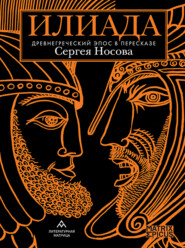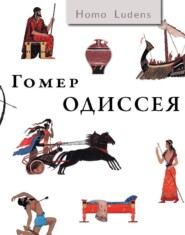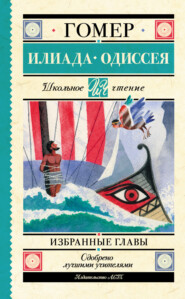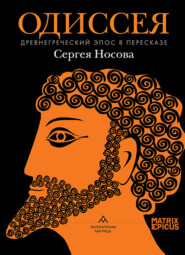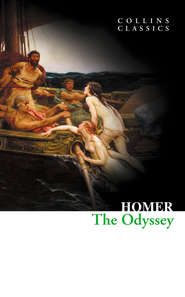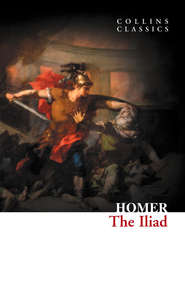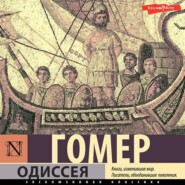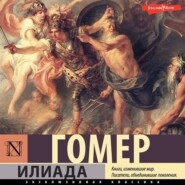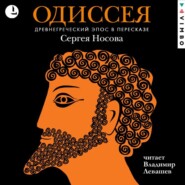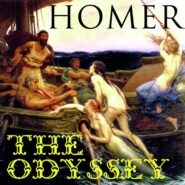По всем вопросам обращайтесь на: info@litportal.ru
(©) 2003-2024.
✖
The Iliad
Настройки чтения
Размер шрифта
Высота строк
Поля
He said, and rushed in tumult on Achilles, raging from on high, thundering with foam and blood and bodies of dead men. Then did a dark wave of the heaven-sprung River stand towering up and overwhelm the son of Peleus. But Hera cried aloud in terror of Achilles, lest the great deep-eddying River sweep him away, and straightway she called to Hephaistos, her dear son: "Rise, lame god, O my son; it was against thee we thought that eddying Xanthos was matched in fight. Help with all speed, put forth large blast of flame. Then will I go to raise a strong storm out of the sea of the west wind and the white south which shall utterly consume the dead Trojans and their armour, blowing the angry flame. Thou along Xanthos' banks burn up his trees and wrap himself in fire, nor let him anywise turn thee back by soft words or by threat, nor stay thy rage – only when I cry to thee with my voice, then hold the unwearying fire."
Thus spake she, and Hephaistos made ready fierce-blazing fire. First on the plain fire blazed, and burnt the many dead who lay there thick, slain by Achilles; and all the plain was parched and the bright water stayed. And as when in late summer the north wind swiftly parcheth a new watered orchard, and he that tilleth it is glad, thus was the whole plain parched, and Hephaistos consumed the dead; then against the river he turned his gleaming flame. Elms burnt and willow trees and tamarisks, and lotos burnt and rush and galingale which round the fair streams of the river grew in multitude. And the eels and fishes beneath the eddies were afflicted, which through the fair streams tumbled this way and that, in anguish at the blast of crafty Hephaistos. And the strong River burned, and spake and called to him by name: "Hephaistos, there is no god can match with thee, nor will I fight thee thus ablaze with fire. Cease strife, yea, let noble Achilles drive the Trojans forthwith out of their city; what have I to do with strife and succour?"
Thus spake he, burnt with fire, for his fair streams were bubbling. And as a cauldron boileth within, beset with much fire, melting the lard of some fatted hog spurting up on all sides, and logs of firewood lie thereunder, – so burned his fair streams in the fire, and the water boiled. He had no mind to flow, but refrained him, for the breath of cunning Hephaistos violently afflicted him. Then unto Hera, earnestly beseeching her,' he spake winged words: "Hera, wherefore hath thy son assailed my stream to vex it above others? I am less chargeable than all the rest that are helpers of the Trojans. But lo, I will give over, if thou wilt, and let thy son give over too. And I further will swear even this, that never will I ward the day of evil from the Trojans, not even when all Troy is burning in the blaze of hungry fire, and the warlike sons of Achaians are the burners thereof."
Then when the white-armed goddess Hera heard his speech, straightway she spake unto Hephaistos her dear son: "Hephaistos, hold, famed son; it befitteth not thus for mortals' sake to do violence to an immortal god."
Thus said she and Hephaistos quenched the fierce-blazing fire, and the wave once more rolled down the fair river-bed.
So when the rage of Xanthos was overcome, both ceased, for Hera stayed them, though in wrath. But among the other gods fell grievous bitter strife, and their hearts were carried diverse in their breasts. And they clashed together with a great noise, and the wide earth groaned, and the clarion of great Heaven rang around. Zeus heard as he sate upon Olympus, and his heart within him laughed pleasantly when he beheld that strife of gods. Then no longer stood they asunder, for Ares piercer of shields began the battle and first made for Athene with his bronze spear, and spake a taunting word: "Wherefore, O dogfly, dost thou match gods with gods in strife, with stormy daring, as thy great spirit moveth thee? Rememberest thou not how thou movedst Diomedes Tydeus' son to wound me, and thyself didst take a visible spear and thrust it straight at me and pierce through my fair skin? Therefore deem I now that thou shalt pay me for all that thou hast done."
Thus saying he smote on the dread tasselled aegis that not even the lightning of Zeus can overcome – thereon smote bloodstained Ares with his long spear. But she, giving back, grasped with stout hand a stone that lay upon the plain, black, rugged, huge, which men of old time set to be the landmark of a field; this hurled she, and smote impetuous Ares on the neck, and unstrung his limbs. Seven roods he covered in his fall, and soiled his hair with dust, and his armour rang upon him. And Pallas Athene laughed, and spake to him winged words exultingly: "Fool, not even yet hast thou learnt how far better than thou I claim to be, that thus thou matchest thy might with mine. Thus shalt thou satisfy thy mother's curses, who deviseth mischief against thee in her wrath, for that thou hast left the Achaians and givest the proud Trojan's aid."
Thus having said she turned from him her shining eyes. Him did Aphrodite daughter of Zeus take by the hand and lead away, groaning continually, for scarce gathered he his spirit back to him. But when the white-armed goddess Hera was aware of them, straightway she spake unto Athene winged words: "Out on it, child of aegis-bearing Zeus, maiden invincible, lo there the dogfly is leading Ares destroyer of men out of the fray of battle down the throng – nay then, pursue her."
She said, and Athene sped after her with heart exultant, and made at her and smote her with stout hand upon the breast, and straightway her knees and heart were unstrung. So they twain lay on the bounteous earth, and she spake winged words exultingly: "Such let all be who give the Trojans aid when they fight against the mailed Argives. Be they even so bold and brave as Aphrodite when she came to succour Ares and defied my might. Then should we long ago have ceased from war, having laid waste the stablished citadel of Ilios."
[She said, and the white-armed goddess Hera smiled.] Then to Apollo spake the earth-shaking lord: "Phoebus, why stand we apart? It befitteth not after the rest have begun: that were the more shameful if without fighting we should go to Olympus to the bronze-thresholded house of Zeus. Begin, for thou art younger; it were not meet for me, since I was born first and know more. Fond god, how foolish is thy heart! Thou rememberest not all the ills we twain alone of gods endured at Ilios, when by ordinance of Zeus we came to proud Laomedon and served him through a year for promised recompense, and he laid on us his commands. I round their city built the Trojans a wall, wide and most fair, that the city might be unstormed, and thou Phoebus, didst herd shambling crook-horned kine among the spurs of woody many-folded Ida. But when the joyous seasons were accomplishing the term of hire, then redoubtable Laomedon robbed us of all hire, and sent us off with threats. He threatened that he would bind together our feet and hands and sell us into far-off isles, and the ears of both of us he vowed to shear off with the sword. So we went home with angry hearts, wroth for the hire he promised and gave us not. To his folk not thou showest favour, nor essayest with us how the proud Trojans may be brought low and perish miserably with their children and noble wives."
Then to him answered King Apollo the Far-darter: "Shaker of the earth, of no sound mind wouldst thou repute me if I should fight against thee for the sake of pitiful mortals, who like unto leaves now live in glowing life, consuming the fruit of the earth, and now again pine into death. Let us with all speed cease from combat, and let them do battle by themselves."
Thus saying he turned away, for he felt shame to deal in blows with his father's brother. But his sister upbraided him sore, the queen of wild beasts, huntress Artemis, and spake a taunting word: "So then thou fleest, Far-darter, hast quite yielded to Poseidon the victory, and given him glory for naught! Fond god, why bearest thou an ineffectual bow in vain? Let me not hear thee again in the halls of our sire boast as before among the immortal gods thou wouldst stand up to fight against Poseidon."
Thus spake she, but far-darting Apollo answered her not. But angrily the noble spouse of Zeus [upbraided the Archer Queen with taunting words: ] "How now art thou fain, bold vixen, to set thyself against me? Hard were it for thee to match my might, bow-bearer though thou art, since against women Zeus made thee a lion, and giveth thee to slay whomso of them thou wilt. Truly it is better on the mountains to slay wild beasts and deer than to fight amain with mightier than thou. But if thou wilt, try war, that thou mayest know well how far stronger am I, since thou matchest thy might with mine."
She said, and with her left hand caught both the other's hands by the wrist, and with her right took the bow from off her shoulders, and therewith, smiling, beat her on the ears as she turned this way and that; and the swift arrows fell out of her quiver. And weeping from before her the goddess fled like a dove that from before a falcon flieth to a hollow rock, a cleft – for she was not fated to be caught; – thus Artemis fled weeping, and left her bow and arrows where they lay. Then to Leto spake the Guide, the slayer of Argus: "Leto, with thee will I no wise fight; a grievous thing it is to come to blows with wives of cloud-gathering Zeus; but boast to thy heart's content among the immortal gods that thou didst vanquish me by might and main."
Thus said he, and Leto gathered up the curved bow and arrows fallen hither and thither amid the whirl of dust: so taking her daughter's bow she went back. And the maiden came to Olympus, to the bronze-thresholded house of Zeus, and weeping set herself on her father's knee, while round her her divine vesture quivered: and her father, Kronos' son, took her to him and asked of her, laughing gently: "Who of the inhabitants of heaven, dear child, hath dealt with thee thus [hastily, as though thou hadst been doing some wrong thing openly]?"
And to him in answer spake the fair-crowned queen of the echoing chase: "It was thy wife that buffeted me, father, the white-armed Hera, from whom are strife and contention come upon the immortals."
Thus talked they unto one another. Then Phoebus Apollo entered into sacred Ilios, for he was troubled for the wall of the well-builded city, lest the Danaans waste it before its hour upon that day. But the other ever-living gods went to Olympus, some angry and some greatly triumphing, and sat down beside Zeus who hideth himself in dark clouds.
Now Achilles was still slaying the Trojans, both themselves and their whole-hooved horses. And as when a smoke goeth up to the broad heaven, when a city burneth, kindled by the wrath of gods, and causeth toil to all, and griefs to many, thus caused Achilles toil and griefs to the Trojans. And the old man Priam stood on the sacred tower, and was aware of dread Achilles, how before him the Trojans thronged in rout, nor was any succour found of them. Then with a cry he went down from the tower, to rouse the gallant warders along the walls: "Hold open the gates in your hands until the folk come to the city in their rout, for closely is Achilles chasing them – now trow I there will be deadly deeds. And when they are gathered within the wall and are taking breath, then again shut back the gate-wings firmly builded; for I fear lest that murderous man spring in within the wall."
Thus spake he, and they opened the gates and thrust back the bolts; and the gates flung back gave safety. Then Apollo leapt forth to the front that he might ward destruction from the Trojans. They straight for the city and the high wall were fleeing, parched with thirst and dust-grimed from the plain, and Achilles chased them vehemently with his spear, for strong frenzy possessed his heart continually, and he thirsted to win him renown. Then would the sons of the Achaians have taken high-gated Troy, had not Phoebus Apollo aroused goodly Agenor, Antenor's son, a princely man and strong. In his heart he put good courage, and himself stood by his side that he might ward off the grievous visitations of death, leaning against the oak, and he was shrouded in thick mist. So when Agenor was aware of Achilles waster of cities, he halted, and his heart much wavered as he stood; and in trouble he spake to his great heart: "Ay me, if I flee before mighty Achilles, there where the rest are driven terror-struck, nathless will he overtake me and slaughter me as a coward. Or what if I leave these to be driven before Achilles the son of Peleus, and flee upon my feet from the wall by another way to the Ileian plain, until I come to the spurs of Ida, and hide me in the underwood? So then at evening, having bathed in the river and refreshed me of sweat, I might return to Ilios. Nay, why doth my heart debate thus within me? Lest he might be aware of me as I get me from the city for the plain, and speeding after overtake me with swift feet; then will it no more be possible to avoid the visitation of death, for he is exceeding mighty above all mankind. What then if in front of the city I go forth to meet him? Surely his flesh too is penetrable by sharp bronze, and there is but one life within, and men say he is mortal, howbeit Zeus the son of Kronos giveth him renown."
Thus saying, he gathered himself to await Achilles, and within him his stout heart was set to strive and fight. As a leopardess goeth forth from a deep thicket to affront a huntsman, nor is afraid at heart, nor fleeth when she heareth the bay of hounds; for albeit the man first smite her with thrust or throw, yet even pierced through with the spear she ceaseth not from her courage until she either grapple or be slain, so noble Antenor's son, goodly Agenor, refused to flee till he should put Achilles to the proof, but held before him the circle of his shield, and aimed at him with his spear, and cried aloud: "Doubtless thou hopest in thy heart, noble Achilles, on this day to sack the city of the proud men of Troy. Fond man, there shall many woful things yet be wrought before it, for within it we are many men and staunch, who in front of our parents dear and wives and sons keep Ilios safe; but thou shalt here meet death, albeit so redoubtable and bold a man of war."
He said, and hurled his sharp spear with weighty hand, and smote him on the leg beneath the knee, nor missed his mark, and the greave of new-wrought tin rang terribly on him; but the bronze bounded back from him it smote, nor pierced him, for the god's gift drave it back. Then the son of Peleus in his turn made at godlike Agenor, but Apollo suffered him not to win renown, but caught away Agenor, and shrouded him in thick mist, and sent him in peace to be gone out of the war. Then by wile kept the son of Peleus away from the folk, for in complete semblance of Agenor himself he stood before the feet of Achilles, who hasted to run upon him and chase him. And while he chased him over the wheat-bearing plain, edging him toward the deep-eddying river Skamandros, as he ran but a little in front of him (for by wile Apollo beguiled him that he kept ever hoping to overtake him in the race), meantime the other Trojans in common rout came gladly unto their fastness, and the city was filled with the throng of them. Neither had they heart to await one another outside the city and wall, and to know who might have escaped and who had perished in the fight, but impetuously they poured into the city, whomsoever of them his feet and knees might save.
BOOK XXII
Thus they throughout the city, scared like fawns, were cooling their sweat and drinking and slaking their thirst, leaning on the fair battlements, while the Achaians drew near the wall, setting shields to shoulders. But Hector deadly fate bound to abide in his place, in front of Ilios and the Skaian gates. Then to the son of Peleus spake Phoebus Apollo: "Wherefore, son of Peleus, pursuest thou me with swift feet, thyself being mortal and I a deathless god? Thou hast not even yet known me, that I am a god, but strivest vehemently. Truly thou regardest not thy task among the affliction of the Trojans whom thou affrightedst, who now are gathered into the city, while thou heat wandered hither. Me thou wilt never slay, for I am not subject unto death."
Then mightily moved spake unto him Achilles fleet of foot: "Thou hast baulked me, Far-darter, most mischievous of all the gods, in that thou hast turned me hither from the wall: else should full many yet have bitten the dust or ever within Ilios had they come. Now hast thou robbed me of great renown, and lightly hast saved them, because thou hadst no vengeance to fear thereafter. Verily I would avenge me on thee, had I but the power."
Thus saying toward the city he was gone in pride of heart, rushing like some victorious horse in a chariot, that runneth lightly at full speed over the plain; so swiftly plied Achilles his feet and knees. Him the old man Priam first beheld as he sped across the plain, blazing as the star that cometh forth at harvest-time, and plain seen his rays shine forth amid the host of stars in the darkness of night, the star whose name men call Orion's Dog. Brightest of all is he, yet for an evil sign is he set, and bringeth much fever upon hapless men. Even so on Achilles' breast the bronze gleamed as he ran. And the old man cried aloud and beat upon his head with his hands, raising them on high, and with a cry called aloud beseeching his dear son; for he before the gates was standing, all hot for battle with Achilles. And the old man spake piteously unto him, stretching forth his hands: "Hector, beloved son, I pray thee await not this man alone with none beside thee, lest thou quickly meet thy doom, slain by the son of Peleus, since he is mightier far, a merciless man. Would the gods loved him even as do I! then quickly would dogs and vultures devour him on the field – thereby would cruel pain go from my heart – the man who hath bereft me of many valiant sons, slaying them and selling them captive into far-off isles. Ay even now twain of my children, Lykaon and Polydoros, I cannot see among the Trojans that throng into the fastness, sons whom Laothoe bare me, a princess among women. If they be yet alive amid the enemy's host, then will we ransom them with bronze and gold, for there is store within, for much goods gave the old man famous Altes to his child. If they be dead, then even in the house of Hades shall they be a sorrow to my soul and to their mother, even to us who gave them birth, but to the rest of the folk a briefer sorrow, if but thou die not by Achilles' hand. Nay, come within the wall, my child, that thou preserve the men and women of Troy, neither give great triumph to the son of Peleus, and be thyself bereft of sweet life. Have compassion also on me, the helpless one, who still can feel, ill-fated; whom the father, Kronos' son, will bring to naught by a grievous doom in the path of old age, having seen full many ills, his sons perishing and his daughters carried away captive, and his chambers laid waste and infant children hurled to the ground in terrible war, and his sons' wives dragged away by the ruinous hands of the Achaians. Myself then last of all at the street door will ravening dogs tear, when some one by stroke or throw of the sharp bronze hath bereft my limbs of life – even the dogs I reared in my halls about my table and to guard my door, which then having drunk my blood, maddened at heart shall lie in the gateway. A young man all beseemeth, even to be slain in war, to be torn by the sharp bronze and lie on the field; though he be dead yet is all honourable to him, whate'er be seen: but when dogs defile the hoary head and hoary beard of an old man slain, this is the most piteous thing that cometh upon hapless men."
Thus spake the old man, and grasped his hoary hairs, plucking them from his head, but he persuaded not Hector's soul. Then his mother in her turn wailed tearfully, loosening the folds of her robe, while with the other hand she showed her breast; and through her tears spake to him winged words: "Hector, my child, have regard unto this bosom and pity me, if ever I gave thee consolation of my breast. Think of it, dear child, and from this side the wall drive back the foe, nor stand in front to meet him. He is merciless; if he slay thee it will not be on a bed that I or thy wife shall bewail thee, my own dear child, but far away from us by the ships of the Argives will swift dogs devour thee."
Thus they with wailing spake to their dear son, beseeching him sore, yet they persuaded not Hector's soul, but he stood awaiting Achilles as he drew nigh in giant might. As a serpent of the mountains upon his den awaiteth a man, having fed on evil poisons, and fell wrath hath entered into him, and terribly he glared as he coileth himself about his den, so Hector with courage unquenchable gave not back, leaning his shining shield against a jutting tower. Then sore troubled he spake to his great heart: "Ay me, if I go within the gates and walls, Polydamas will be first to bring reproach against me, since he bade me lead the Trojans to the city during this ruinous night, when noble Achilles arose. But I regarded him not, yet surely it had been better far. And now that I have undone the host by my wantonness, I am ashamed before the men of Troy and women of trailing robes, lest at any time some worse man than I shall say: 'Hector by trusting his own might undid the host.' So will they speak; then to me would it be better far to face Achilles and either slay him and go home, or myself die gloriously before the city. Or what if I lay down my bossy shield and my stout helm, and lean my spear against the wall, and go of myself to meet noble Achilles and promise him that Helen, and with her all possessions that Alexandros brought in hollow ships to Troy, the beginning of strife, we will give to the Sons of Atreus to take away, and therewithal to divide in half with the Achaians all else that this city holdeth: and if thereafter I obtain from the Trojans an oath of the Elders that they will hide nothing but divide all in twain [whatever wealth the pleasant city hold within]? But wherefore doth my heart debate thus? I might come unto him and he would not pity or regard me at all, but presently slay me unarmed as it were but a woman, if I put off my armour. No time is it now to dally with him from oaktree or from rock, like youth with maiden, as youth and maiden hold dalliance one with another. Better is it to join battle with all speed: let us know upon which of us twain the Olympian shall bestow renown."
Thus pondered he as he stood, but nigh on him came Achilles, peer of Enyalios warrior of the waving helm, brandishing from his right shoulder the Pelian ash, his terrible spear; and all around the bronze on him flashed like the gleam of blazing fire or of the Sun as he ariseth. And trembling seized Hector as he was aware of him, nor endured he to abide in his place, but left the gates behind him and fled in fear. And the son of Peleus darted after him, trusting in his swift feet. As a falcon upon the mountains, swiftest of winged things, swoopeth fleetly after a trembling dove; and she before him fleeth, while he with shrill screams hard at hand still darteth at her, for his heart urgeth him to seize her; so Achilles in hot haste flew straight for him, and Hector fled beneath the Trojans' wall, and plied swift knees. They past the watch-place and wind-waved wild fig-tree sped ever, away from under the wall, along the waggon-track, and came to the two fair-flowing springs, where two fountains rise that feed deep-eddying Skamandros. The one floweth with warm water, and smoke goeth up therefrom around as it were from a blazing fire, while the other even in summer floweth forth like cold hail or snow or ice that water formeth. And there beside the springs are broad washing-troughs hard by, fair troughs of stone, where wives and fair daughters of the men of Troy were wont to wash bright raiment, in the old time of peace, before the sons of the Achaians came. Thereby they ran, he flying, he pursuing. Valiant was the flier but far mightier he who fleetly pursued him. For not for beast of sacrifice or for an oxhide were they striving, such as are prizes for men's speed of foot, but for the life of horse-taming Hector was their race. And as when victorious whole-hooved horses run rapidly round the turning-points, and some great prize lieth in sight, be it a tripod or a woman, in honour of a man that is dead, so thrice around Priam's city circled those twain with flying feet, and all the gods were gazing on them. Then among them spake first the father of gods and men: "Ay me, a man beloved I see pursued around the wall. My heart is woe for Hector, who hath burnt for me many thighs of oxen amid the crests of many-folded Ida, and other times on the city-height; but now is goodly Achilles pursuing him with swift feet round Priam's town. Come, give your counsel, gods, and devise whether we shall save him from death or now at last slay him, valiant though he be, by the hand of Achilles Peleus' son."
Then to him answered the bright-eyed goddess Athene: "O Father, Lord of the bright lightning and the dark cloud, what is this thou hast said? A man that is a mortal, doomed long ago by fate, wouldst thou redeem back from ill-boding death? Do it, but not all we other gods approve."
And unto her in answer spake cloud-gathering Zeus: "Be of good cheer, Trito-born, dear child: not in full earnest speak I, and I would fain be kind to thee. Do as seemeth good to thy mind, and draw not back."
Thus saying he roused Athene, that already was set thereon, and from the crests of Olympus she darted down.
But after Hector sped fleet Achilles chasing him vehemently. And as when on the mountains a hound hunteth the fawn of a deer, having started it from its covert, through glens and glades, and if it crouch to baffle him under a bush, yet scenting it out the hound runneth constantly until he find it; so Hector baffled not Peleus' fleet-footed son. Oft as he set himself to dart under the well-built walls over against the Dardanian gates, if haply from above they might succour him with darts, so oft would Achilles gain on him and turn him toward the plain, while himself he sped ever on the city-side. And as in a dream one faileth in chase of a flying man, the one faileth in his flight and the other in his chase – so failed Achilles to overtake him in the race, and Hector to escape. And thus would Hector have avoided the visitation of death, had not this time been utterly the last wherein Apollo came nigh to him, who nerved his strength and his swift knees. For to the host did noble Achilles sign with his head, and forbade them to hurl bitter darts against Hector, lest any smiting him should gain renown, and he himself come second. But when the fourth time they had reached the springs, then the Father hung his golden balances, and set therein two lots of dreary death, one of Achilles, one of horse-taming Hector, and held them by the midst and poised. Then Hector's fated day sank down, and fell to the house of Hades, and Phoebus Apollo left him. But to Peleus' son came the bright-eyed goddess Athene, and standing near spake to him winged words: "Now verily, glorious Achilles dear to Zeus, I have hope that we twain shall carry off great glory to the ships for the Achaians, having slain Hector, for all his thirst for fight. No longer is it possible for him to escape us, not even though far-darting Apollo should travail sore, grovelling before the Father, aegis-bearing Zeus. But do thou now stand and take breath, and I will go and persuade this man to confront thee in fight."
Thus spake Athene, and he obeyed, and was glad at heart, and stood leaning on his bronze-pointed ashen-spear. And she left him and came to noble Hector, like unto Deiphobos in shape and in strong voice, and standing near spake to him winged words: "Dear brother, verily fleet Achilles doth thee violence, chasing thee round Priam's town with swift feet: but come let us make a stand and await him on our defence."
Then answered her great Hector of the glancing helm: "Deiphobos, verily aforetime wert thou far dearest of my brothers, but now methinks I shall honour thee even more, in that thou hast dared for my sake, when thou sawest me, to come forth of the wall, while the others tarry within."
Then to him again spake the bright-eyed goddess Athene: "Dear brother, of a truth my father and lady mother and my comrades around besought me much, entreating me in turn, to tarry there, so greatly do they all tremble before him; but my heart within was sore with dismal grief. And now fight we with straight-set resolve and let there be no sparing of spears, that we may know whether Achilles is to slay us and carry our bloody spoils to the hollow ships, or whether he might be vanquished by thy spear."
Thus saying Athene in her subtlety led him on. And when they were come nigh in onset on one another, to Achilles first spake great Hector of the glancing helm: "No longer, son of Peleus, will I fly thee, as before I thrice ran round the great town of Priam, and endured not to await thy onset. Now my heart biddeth me stand up against thee; I will either slay or be slain. But come hither and let us pledge us by our gods, for they shall be best witnesses and beholders of covenants: I will entreat thee in no outrageous sort, if Zeus grant me to outstay thee, and if I take thy life, but when I have despoiled thee of thy glorious armour, O Achilles, I will give back thy dead body to the Achaians, and do thou the same."
But unto him with grim gaze spake Achilles fleet of foot: "Hector, talk not to me, thou madman, of covenants. As between men and lions there is no pledge of faith, nor wolves and sheep can be of one mind, but imagine evil continually against each other, so is it impossible for thee and me to be friends, neither shall be any pledge between us until one or other shall have fallen and glutted with blood Ares, the stubborn god of war. Bethink thee of all thy soldiership: now behoveth it thee to quit thee as a good spearman and valiant man of war. No longer is there way of escape for thee, but Pallas Athene will straightway subdue thee to my spear; and now in one hour shalt thou pay back for all my sorrows for my friends whom thou hast slain in the fury of thy spear."
He said, and poised his far-shadowing spear and hurled. And noble Hector watched the coming thereof and avoided it; for with his eye on it he crouched, and the bronze spear flew over him, and fixed itself in the earth; but Pallas Athene caught it up and gave it back to Achilles, unknown of Hector shepherd of hosts. Then Hector spake unto the noble son of Peleus: "Thou hast missed, so no wise yet, godlike Achilles, has thou known from Zeus the hour of my doom, though thou thoughtest it. Cunning of tongue art thou and a deceiver in speech, that fearing thee I might forget my valour and strength. Not as I flee shalt thou plant thy spear in my reins, but drive it straight through my breast as I set on thee, if God hath given thee to do it. Now in thy turn avoid my spear of bronze. O that thou mightst take it all into thy flesh! Then would the war be lighter to the Trojans, if but thou wert dead, for thou art their greatest bane."
He said, and poised his long-shadowed spear and hurled it, and smote the midst of the shield of Peleus' son, and missed him not: but far from the shield the spear leapt back. And Hector was wroth that his swift weapon had left his hand in vain, and he stood downcast, for he had no second ashen spear. And he called with a loud shout to Deiphobos of the white shield, and asked of him a long spear, but he was no wise nigh. Then Hector knew he truth in his heart, and spake and said: "Ay me, now verily the gods have summoned me to death. I deemed the warrior Deiphobos was by my side, but he is within the wall, and it was Athene who played me false. Now therefore is evil death come very nigh me, not far off, nor is there way of escape. This then was from of old the pleasure of Zeus and of the far-darting son of Zeus, who yet before were fain to succour me: but now my fate hath found me. At least let me not die without a struggle or ingloriously, but in some great deed of arms whereof men yet to be born shall hear."
Thus saying he drew his sharp sword that by his flank hung great and strong, and gathered himself and swooped like a soaring eagle that darteth to the plain through the dark clouds to seize a tender lamb or crouching hare. So Hector swooped, brandishing his sharp sword. And Achilles made at him, for his heart was filled with wild fierceness, and before his breast he made a covering with his fair graven shield, and tossed his bright four-plated helm; and round it waved fair golden plumes [that Hephaistos had set thick about the crest.]. As a star goeth among stars in the darkness of night, Hesperos, fairest of all stars set in heaven, so flashed there forth a light from the keen spear Achilles poised in his right hand, devising mischief against noble Hector, eyeing his fair flesh to find the fittest place. Now for the rest of him his flesh was covered by the fair bronze armour he stripped from strong Patroklos when he slew him, but there was an opening where the collar bones coming from the shoulders clasp the neck, even at the gullet, where destruction of life cometh quickliest; there, as he came on, noble Achilles drave at him with his spear, and right through the tender neck went the point. Yet the bronze-weighted ashen spear clave not the windpipe, so that he might yet speak words of answer to his foe. And he fell down in the dust, and noble Achilles spake exultingly: "Hector, thou thoughtest, whilst thou wert spoiling Patroklos, that thou wouldst be safe, and didst reck nothing of me who was afar, thou fool. But away among the hollow ships his comrade, a mightier far, even I, was left behind, who now have unstrung thy knees. Thee shall dogs and birds tear foully, but his funeral shall the Achaians make."
Then with faint breath spake unto him Hector of the glancing helm: "I pray thee by thy life and knees and parents leave me not for dogs of the Achaians to devour by the ships, but take good store of bronze and gold, gifts that my father and lady mother shall give to thee, and give them home my body back again, that the Trojans and Trojans' wives give me my due of fire after my death."
But unto him with grim gaze spake Achilles fleet of foot: "Entreat me not, dog, by knees or parents. Would that my heart's desire could so bid me myself to carve and eat raw thy flesh, for the evil thou hast wrought me, as surely is there none that shall keep the dogs from thee, not even should they bring ten or twenty fold ransom and here weigh it out, and promise even more, not even were Priam Dardanos' son to bid pay thy weight in gold, not even so shall thy lady mother lay thee on a bed to mourn her son, but dogs and birds shall devour thee utterly."
Then dying spake unto him Hector of the glancing helm: "Verily I know thee and behold thee as thou art, nor was I destined to persuade thee; truly thy heart is iron in thy breast. Take heed now lest I draw upon thee wrath of gods, in the day when Paris and Phoebus Apollo slay thee, for all thy valour, at the Skaian gate."
He ended, and the shadow of death came down upon him, and his soul flew forth of his limbs and was gone to the house of Hades, wailing her fate, leaving her vigour and youth. Then to the dead man spake noble Achilles: "Die: for my death, I will accept it whensoever Zeus and the other immortal gods are minded to accomplish it."
He said, and from the corpse drew forth his bronze spear, and set it aside, and stripped the bloody armour from the shoulders. And other sons of Achaians ran up around, who gazed upon the stature and marvellous goodliness of Hector. Nor did any stand by but wounded him, and thus would many a man say looking toward his neighbour: "Go to, of a truth far easier to handle is Hector now than when he burnt the ships with blazing fire." Thus would many a man say, and wound him as he stood hard by. And when fleet noble Achilles had despoiled him, he stood up among the Achaians and spake winged words: "Friends, chiefs and counsellors of the Argives, since the gods have vouchsafed us to vanquish this man who hath done us more evil than all the rest together, come let us make trial in arms round about the city, that we may know somewhat of the Trojans' purpose, whether since he hath fallen they will forsake the citadel, or whether they are minded to abide, albeit Hector is no more. But wherefore doth my heart debate thus? There lieth by the ships a dead man unbewailed, unburied, Patroklos; him will I not forget, while I abide among the living and my knees can stir. Nay if even in the house of Hades the dead forget their dead, yet will I even there be mindful of my dear comrade. But come, ye sons of the Achaians, let us now, singing our song of victory, go back to the hollow ships and take with us our foe. Great glory have we won; we have slain the noble Hector, unto whom the Trojans prayed throughout their city, as he had been a god."
He said, and devised foul entreatment of noble Hector. The tendons of both feet behind he slit from heel to ankle-joint, and thrust therethrough thongs of ox-hide, and bound him to his chariot, leaving his head to trail. And when he had mounted the chariot and lifted therein the famous armour, he lashed his horses to speed, and they nothing loth flew on. And dust rose around him that was dragged, and his dark hair flowed loose on either side, and in the dust lay all his once fair head, for now had Zeus given him over to his foes to entreat foully in his own native land.
Thus was his head all grimed with dust. But his mother when she beheld her son, tore her hair and cast far from her her shining veil, and cried aloud with an exceeding bitter cry. And piteously moaned his father, and around them the folk fell to crying and moaning throughout the town. Most like it seemed as though all beetling Ilios were burning utterly in fire. Scarcely could the folk keep back the old man in his hot desire to get him forth of the Dardanian gates. For he besought them all, casting himself down in the mire, and calling on each man by his name: "Hold, friends, and though you love me leave me to get me forth of the city alone and go unto the ships of the Achaians. Let me pray this accursed horror-working man, if haply he may feel shame before his age-fellows and pity an old man. He also hath a father such as I am, Peleus, who begat and reared him to be a bane of Trojans – and most of all to me hath he brought woe. So many sons of mine hath he slain in their flower – yet for all my sorrow for the rest I mourn them all less than this one alone, for whom my sharp grief will bring me down to the house of Hades – even Hector. Would that he had died in my arms; then would we have wept and wailed our fill, his mother who bore him to her ill hap, and I myself."
Thus spake he wailing, and all the men of the city made moan with him. And among the women of Troy, Hekabe led the wild lament: "My child, ah, woe is me! wherefore should I live in my pain, now thou art dead, who night and day wert my boast through the city, and blessing to all, both men and women of Troy throughout the town, who hailed thee as a god, for verily an exceeding glory to them wert thou in thy life: – now death and fate have overtaken thee."
Thus spake she wailing. But Hector's wife knew not as yet, for no true messenger had come to tell her how her husband abode without the gates, but in an inner chamber of the lofty house she was weaving a double purple web, and broidering therein manifold flowers. Then she called to her goodly-haired handmaids through the house to set a great tripod on the fire, that Hector might have warm washing when he came home out of the battle fond heart, and was unaware how, far from all washings, bright-eyed Athene had slain him by the hand of Achilles. But she heard shrieks and groans from the battlements, and her limbs reeled, and the shuttle fell from her hands to earth. Then again among her goodly-haired maids she spake: "Come two of ye this way with me that I may see what deeds are done. It was the voice of my husband's noble mother that I heard, and in my own breast my heart leapeth to my mouth and my knees are numbed beneath me: surely some evil thing is at hand against the children of Priam. Would that such word might never reach my ear! yet terribly I dread lest noble Achilles have cut off bold Hector from the city by himself and chased him to the plain and ere this ended his perilous pride that possessed him, for never would he tarry among the throng of men but ran out before them far, yielding place to no man in his hardihood."
Thus saying she sped through the chamber like one mad, with beating heart, and with her went her handmaidens. But when she came to the battlements and the throng of men, she stood still upon the wall and gazed, and beheld him dragged before the city: – swift horses dragged him recklessly toward the hollow ships of the Achaians. Then dark night came on her eyes and shrouded her, and she fell backward and gasped forth her spirit. From off her head she shook the bright attiring thereof, frontlet and net and woven band, and veil, the veil that golden Aphrodite gave her on the day when Hector of the glancing helm led her forth of the house of Eetion, having given bride-gifts untold. And around her thronged her husband's sisters and his brothers' wives, who held her up among them, distraught even to death. But when at last she came to herself and her soul returned into her breast, then wailing with deep sobs she spake among the women of Troy: "O Hector, woe is me! to one fate then were we both born, thou in Troy in the house of Priam, and I in Thebe under woody Plakos, in the house of Eetion, who reared me from a little one – ill-fated sire of cruel-fated child. Ah, would he have begotten me not. Now thou to the house of Hades beneath the secret places of the earth departest, and me in bitter mourning thou leavest a widow in thy halls: and thy son is but an infant child – son of unhappy parents, thee and me – nor shalt thou profit him, Hector, since thou art dead, neither he thee. For even if he escape the Achaians' woful war, yet shall labour and sorrow cleave unto him hereafter, for other men shall seize his lands. The day of orphanage sundereth a child from his fellows, and his head is bowed down ever, and his cheeks are wet with tears. And in his need the child seeketh his father's friends, plucking this one by cloak and that by coat, and one of them that pity him holdeth his cup a little to his mouth, and moisteneth his lips, but his palate he moisteneth not. And some child unorphaned thrusteth him from the feast with blows and taunting words, 'Out with thee! no father of thine is at our board.' Then weeping to his widowed mother shall he return, even Astyanax, who erst upon his father's knee ate only marrow and fat flesh of sheep; and when sleep fell on him and he ceased from childish play, then in bed in his nurse's arms he would slumber softly nested, having satisfied his heart with good things; but now that he hath lost his father he will suffer many ills, Astyanax – that name the Trojans gave him, because thou only wet the defence of their gates and their long walls. But now by the beaked ships, far from thy parents, shall coiling worms devour thee when the dogs have had their fill, as thou liest naked; yet in these halls lieth raiment of thine, delicate and fair, wrought by the hands of women. But verily all these will I consume with burning fire – to thee no profit, since thou wilt never lie therein, yet that his be honour to thee from the men and the women of Troy."






